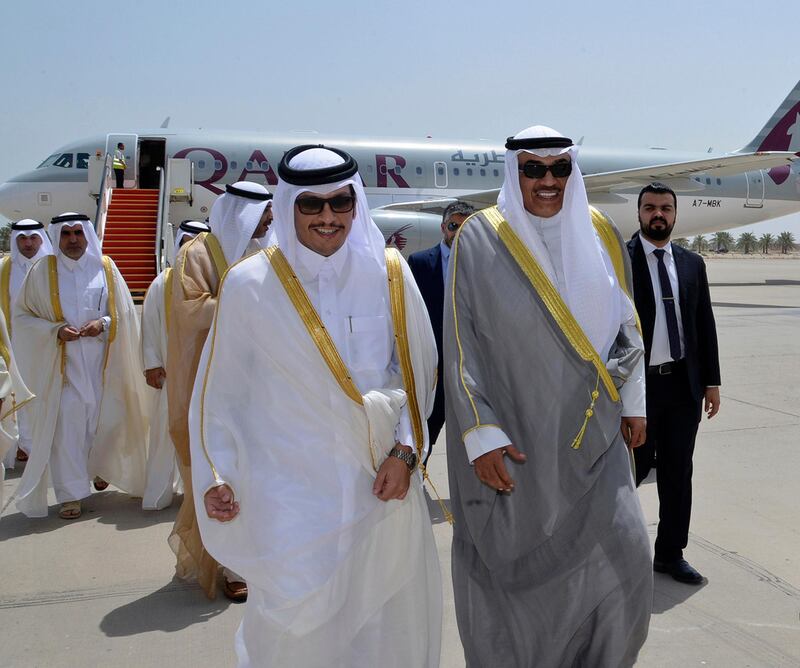Kuwait faces its biggest diplomatic challenge to date as it leads efforts to resolve the month-long crisis that threatens both the unity of the GCC and a key strategic interest of the neutral Gulf country.
Kuwait has maintained neutrality in the intra-GCC dispute and played peacemaker between the four Arab countries and Qatar, in part because the cohesion of the multilateral institution is a key interest for the country, which is the only member of the bloc to have been invaded by a regional power - by Saddam Hussein's forces in 1990.
In the latest development as arbitrator between the two sides, leaders in Kuwait met with the Qatari foreign minister, Sheikh Mohammed AbdulRahman Al Thani, on Monday and worked out a deal to provide Doha with an extra 48 hours to respond to demands issued by Saudi Arabia, the UAE, Bahrain and Egypt.
The announcement came as the deadline for Qatar to respond to the 13 demands expired. Kuwait delivered the list of demands to Qatar on June 22, and is believed to have been integral in softening the two sides' stances on the deadline.
Kuwait’s historically neutral stance in the region places it in a unique position, with the small Gulf state also serving as peace-broker between other GCC countries and Iran.
“The significance of Kuwait’s stance as mediator during the current crisis is very important," said Geoffrey Martin, an analyst at Gulf State Analytics and a specialist on Kuwaiti politics. "Kuwait, unlike Oman, is the only member of the GCC states that is both neutral but also very active in developing and maintaining the cohesiveness of the Gulf Cooperation Council in political and social terms.”
Sheikh Sabah Al Ahmed, the country’s 88-year old monarch, has reaffirmed the country’s key foreign policy interest through his current mediation push.
His track record as a bridge-builder both within the GCC and beyond has often facilitated dialogue and defused tension between rivals in the region. Sheikh Sabah has managed to successfully balance his strong relationship with Saudi Arabia while making steps towards improving Gulf relations with Iran, despite Kuwait's tainted history with Riyadh’s arch-rival.
In 2014, the Kuwaiti ruler played a key role in solving a similar diplomatic dispute between the same GCC countries and Qatar.
Sheikh Sabah was well prepared for the role of mediator by his time as foreign minister of Kuwait from 1965 to 2003, during which he demonstrated his diplomatic clout by garnering international support for his country during the 1991 Gulf War.
As a result of its history in the first Gulf War, Kuwait has pursued stable relations with Iran, which it has seen as providing a power balance to Iraq.
But Sheikh Sabah's role in the latest GCC row is likely to be the most demanding, and success will enhance his reputation as “the wise man of the Gulf".
“He is truly unique in world diplomacy today and has the sort of experience that cannot be developed without a lifetime of dealing with many, many delicate diplomatic issues,” Mr Martin said. “His travel to the countries involved in the crisis is a clear indication of both the seriousness of the crisis and also the commitment of all sides to try to resolve the conflict, although this is very difficult considering the widely diverging interests of the concerned parties.”
Within a day of the four Arab countries cutting ties with Qatar on June 5, the Kuwaiti emir had made trips to Riyadh, Abu Dhabi and Qatar to engage in shuttle diplomacy. His personal efforts have been bolstered by other Kuwaiti officials, including the acting foreign minister, who met in Washington with US secretary of state Rex Tillerson. Mr Tillerson also met with Kuwait’s ambassador to the United States and the secretary general of the United Nations.
The effort made by the nearly 90-year-old emir, who took five flights between countries within 24 hours, was said by observers to have had a humbling effect on his Gulf interlocutors and contributed to the effectiveness of the mediation.
If a resolution to the crisis is eventually found, it would be Sheikh Sabah's biggest diplomatic success yet, significantly boosting Kuwait's credibility as a neutral Arab country skilled in mediation - an asset that could be of significant value for regional and global powers such as the US. Kuwait is also assuming a rotating seat on the UN Security Council for the 2018-2019 term, and such success could enhance its role on the powerful body.
A source in the Diwan Al Amiri, the emir's royal palace, in Kuwait told The National that the country's behind-the-scenes involvement in the Qatari crisis had already helped reduce the temperature - at least for now — of a situation that had been set to escalate much more quickly than it eventually did.
“On the first demand sent to Qatar from Kuwait, the [Kuwaiti] emir contacted the emir of Qatar and told him not to respond until they met in person,” said the source. “The involvement of his highness, the emir of Kuwait, has and still is reducing the amount of tension and unnecessary actions that could have been taken between the GCC and Qatar.”
But even if Sheikh Sabah’s efforts in the current crisis are successful, the source added, it is not clear whether Gulf unity will exist in anything more than name if the entrenched underlying issues are not permanently resolved.





